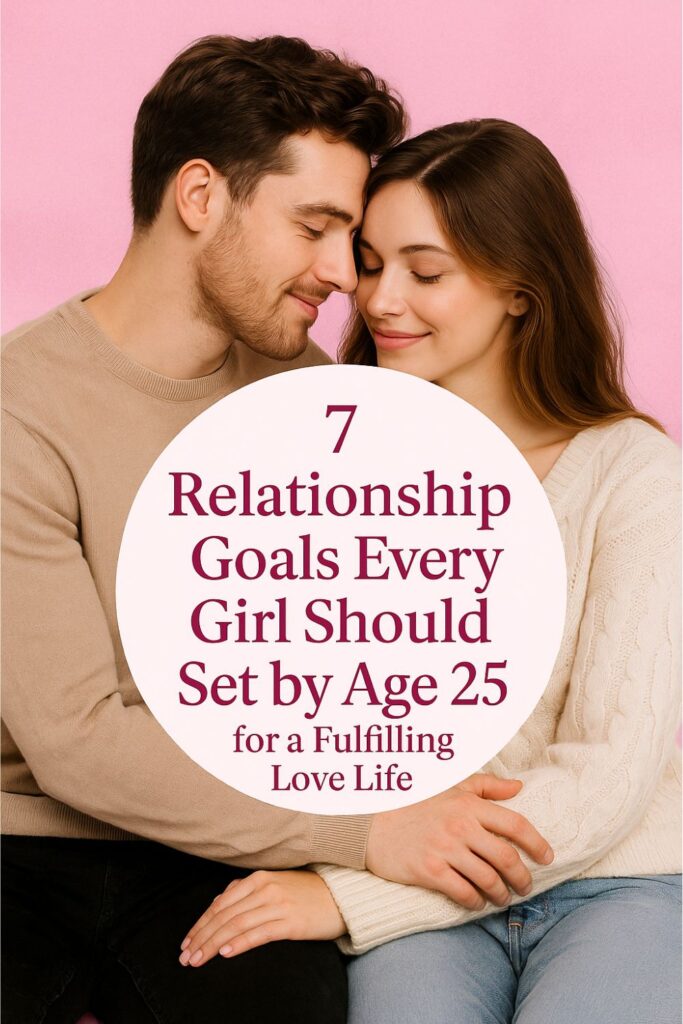Hello beautiful souls! I’m Alina, a lifelong beauty and lifestyle enthusiast who’s always been passionate about real, meaningful relationships.
Over the years, I’ve learned that love is so much more than candlelit dinners and perfect Instagram moments. It’s about growth, respect, and truly knowing yourself.
That’s why I’m so eager to share these 7 relationship goals every girl should set by age 25—not because 25 is a strict deadline, but because this is a powerful age where your self-awareness and life experience start to come together beautifully.
Why do relationships matter so much, especially by 25?
It’s not just about finding “the one” or checking off a societal box. Healthy relationships are foundational to your happiness and personal growth.
When you set clear relationship goals early, you save yourself the heartbreak, confusion, and wasted time that so many go through. It’s about building strong, lasting bonds that elevate your life and enrich your spirit.
And don’t worry, this isn’t some fluffy, unrealistic love advice.
These goals are practical, grounded, and connect directly to your daily life, your self-worth, and your future happiness.
Whether you’re currently single, casually dating, or in a serious relationship, these insights will help you navigate love with clarity and confidence.
So, let’s dive into the real, empowering goals every girl should have by 25 for a truly fulfilling love life!

1. Know Your Worth Before You Commit
Let’s get real: the foundation of any healthy, lasting relationship starts with one key thing—knowing your worth. Sounds simple, right?
But so many women settle for less than they deserve because they don’t fully understand their value.
Self-love isn’t just a trendy phrase; it’s the powerful force that keeps you from accepting toxic patterns, disrespect, or emotional neglect.
When you know your worth, you naturally set clear standards for how you want to be treated.
You stop compromising on your core needs just to avoid loneliness or to “make things work.” And this kind of confidence attracts partners who truly respect and cherish you.
I’ve met so many women who stayed true to themselves, even after heartbreaks, and eventually found love that honored their value. Their relationships weren’t perfect, but they were healthy, supportive, and real.
So how do you start knowing your worth? Begin with daily habits that boost your self-esteem and cultivate self-love. Journaling can be incredibly powerful—write down your strengths, your dreams, and even your boundaries.
Affirmations are another great tool; something as simple as saying, “I am worthy of respect and love” every morning can gradually rewire your mindset.
And here’s where beauty and lifestyle intersect: when you take care of yourself physically—whether that’s a skincare routine, a little makeup, or just dressing in a way that makes you feel amazing—it can elevate your emotional confidence, too.
Remember, self-love isn’t selfish. It’s essential. Before you commit to someone else, make sure you’re fully committed to loving and valuing yourself first. That way, every relationship you build is a step towards greater happiness, not a compromise on your worth.
2. Communicate Openly and Honestly
If there’s one skill that trumps all others in relationships, it’s communication.
I can’t stress enough how often misunderstandings, assumptions, and unspoken feelings lead to breakups or unnecessary conflict. Being able to express yourself clearly and honestly is more important than looks, romance, or grand gestures.
In real life, most relationship issues stem from poor communication. When you don’t talk openly, feelings fester, resentment builds, and partners drift apart.
But when you learn to start conversations without fear or drama, you build a solid foundation of trust. You make it safe for your partner to share, and you become a better listener, too.
So, how do you start practicing this? Begin small. If something’s bothering you, say it calmly instead of bottling it up.
Use “I” statements like “I feel…” or “I need…” to avoid sounding accusatory. For example, instead of “You never listen,” try “I feel unheard when I don’t get a chance to explain.” This softens the conversation and invites understanding.
When disagreements happen—and they will—try to stay calm and focus on solutions, not blame. Ask questions instead of assuming intentions.
If you want something, don’t guess that your partner knows—say it directly. Whether it’s about how much time you spend together or your boundaries around texting, clarity avoids confusion.
Good communication doesn’t just improve your relationship, it also boosts your emotional wellness and reduces stress. When you feel heard and understood, you carry less anxiety and worry. It’s a lifestyle skill that makes every area of your life better—from friendships to work to family.
3. Build Friendship First, Then Romance
One of the best pieces of relationship advice I’ve learned is this: always build friendship first. The strongest, longest-lasting romantic relationships often start with a solid friendship base.
Why?
Because friendship builds trust, fun, and support — things that romantic passion alone can’t sustain forever.
Think about your best friend. You share secrets, support each other through tough times, and genuinely enjoy each other’s company.
When you bring that kind of friendship into a romantic relationship, it creates a partnership that can weather the ups and downs of life.
Many couples I know who have lasted for years credit their success to being best friends first. They laugh together, communicate openly, and support each other’s dreams outside the relationship.
It’s not just about romantic dates or physical attraction — it’s about a deep connection that goes beyond surface-level romance.
To nurture friendship qualities, focus on building trust by being reliable and honest.
Share your interests and be open to theirs. Keep the fun alive with spontaneous adventures or simply enjoying downtime together without pressure. Celebrate each other’s successes and be there through challenges.
From a lifestyle perspective, being a good friend strengthens your entire social life and personal happiness. It helps you become more empathetic, patient, and emotionally available — qualities that benefit all your relationships, romantic or not.
